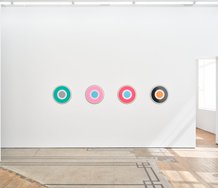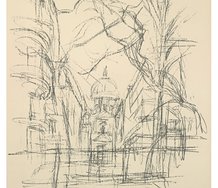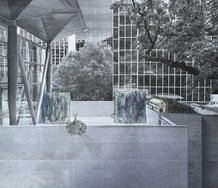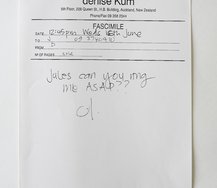John Hurrell – 1 October, 2013
Seen as a way of drawing in splayed out divergences, Hermes' Lack of Words, with its ambiguous structure, swirls around the subtle distractions and spliced-in confusions embraced by the elements of the exhibition. The six writer contributions work beautifully together, elaborating on the jamming or interference of the signals subtly referenced in the exhibition, the scrambling of the senses.
Hermes’ Lack of Words
Commissioning Editor: Alex Davidson
Editor: Will Pollard
Texts: Milli Jannides, Emma Leach, Will Pollard, Evangeline Riddiford Graham, René Daumal, Arthur Rimbaud
Visual contributions: Manon de Boer, Eleanor Cooper, Rosalind Nashashibi, William Hsu; Milli Jannides
Design: Index
Softcover; 72 pp; b/w & colour illustrations
Artspace 2013
Launched as a publication less than a month after the deinstalling of Hermes’ Lack of Words - the exhibition that curatorial intern Alex Davidson organised for Artspace - this softcover book of texts and images is distinctive as an unusual hybrid: its cover and central core reprint parts of a novel by surrealist/anarchist poet René Daumal, and sandwiched within and around these elements are contributions - on the Daumal work’s numbered but initially blank pages - from the original show’s featured artists, now with added commissioned texts.
Admired by Artaud, but scorned by Breton, Daumal is famous for his Rimbaud-influenced experiments with various consciousness-affecting liquids, most notably the inhalable drycleaning fluid, carbon tetrachloride. His ‘Trojan Horse’ book here, A Night of Serious Drinking, is clearly a fascinating document. It has certain key pages reprinted in blue ink - deftly selected by Louise Menzies.
There is clearly a relationship between Daumal and the skilled writers Davidson has invited: Milli Jannides, Emma Leach, Will Pollard, Evangeline Riddiford Graham. Plus one of the artists, Rosalind Nashashibi, has selected a verse from Arthur Rimbaud’s famous Illuminations.
Seen as a way of drawing in splayed out divergences, Hermes’ Lack of Words, with its ambiguous structure, swirls around the subtle distractions and spliced-in confusions embraced by the elements of the exhibition. The six writer contributions work beautifully together, elaborating on the jamming or interference of the signals subtly referenced in the exhibition, the scrambling of the senses.
Rosalind Nashashibi (via Rimbaud) and Louise Menzies (via Daumal) look at the use of alcohol to disrupt the processes of consciousness relying on patterns of articulate language, while Will Pollard introduces the key ideas of Polish-American philosopher Alfred Korzybski, especially his hostility to the verb ‘to be’. Korzybski elaborates on the way language clings to an irregular grid of conceptual co-ordinates allowing ‘reality’ to move through and around, avoiding anything other than a very approximate connection to actual living experience. Our understanding is restricted by the structure of thought and the limitations of our bodies.
Despite being an accomplished creator of multi-purpose narratives and spoken word performances, English artist Emma Leach is strangely unknown here. Her short story about the Moon tarot card (eighteenth trump, linked to the imagination) and a guard working in a surveillance tower on a national border that is about to be shifted, ties in with William Hsu’s work, as well as having lovely poetic resonances with Pollard’s discussion of Korzybski and the slippery properties of words.
Evangeline Riddiford Graham takes this further with a complex discussion that looks at the American philosopher Donald Davidson‘s theory of how language provides meaning. In a 1986 paper (A Nice Derangement of Epitaphs) that examines malapropisms and how they still communicate - despite being ludicrously erroneous - Davidson pointed out (in here and in other essays) that ‘first meaning’ rules or conventions (as say precise correlations with dictionary definitions) are not essential for an interpreter in the fluid processes of meaning transmission.
Near the end of a five part text (with bookmark) that looks at approaches to diary writing and their relationship to painting, walking, poetry and prose, Milli Jannides mentions a technique mentioned by Craig Martin in his essay ‘Some Speculative Approaches to Writing Through Fog’ (2010). She describes it as ‘the type of writing that is disoriented, unstable, too close,’ as if walking through the sea towards the shore through mist. With a brief run of other writers, Jannides then continues the application of metaphor by introducing the idea of a bog or morass (Vita Sackville West), obstructing thickets, ditches, ponds, and no path (Margaret Atwood), a field of strangeness (Michael Taussig), internal banality (Roland Barthes) and nothingness (T.J. Clark).
This core thread links up Alex Davidson’s commissioned selection of lively diverging texts, effectively joining them to the ideational structures parallel in the visual artworks; of thwarted messengers having difficulty speaking. It is a very smartly assembled anthology - I think the classiest curatorial intern publication Artspace has published so far. At fifteen dollars it is excellent value.
John Hurrell
![Cover image of Hermes' Lack of Words: attributed to near the Black Fury Group, painter (Greek [Apulian], activie early 300s B.C.). Wine Jug with Arkas and His Mother, Kallisto, and the God Hermes. Terracotta Object. The J. Paul Getty Museum, Villa Coll.](/media/thumbs/uploads/2013_09/cover_blue_500w_jpg_380x500_q85.jpg)
 Two Rooms presents a program of residencies and projects
Two Rooms presents a program of residencies and projects Advertising in this column
Advertising in this column



This Discussion has 0 comments.
Comment
Participate
Register to Participate.
Sign in
Sign in to an existing account.